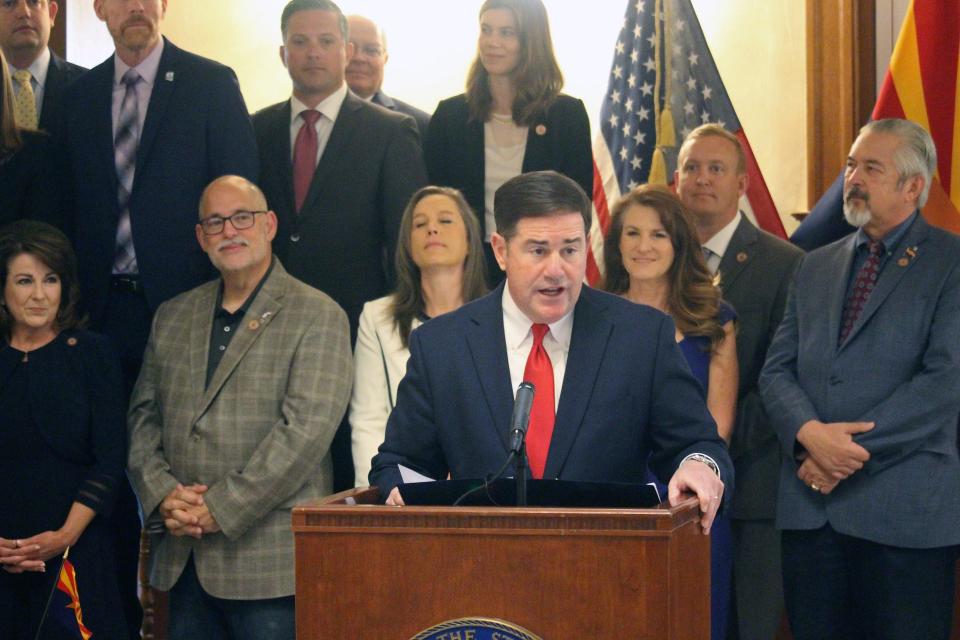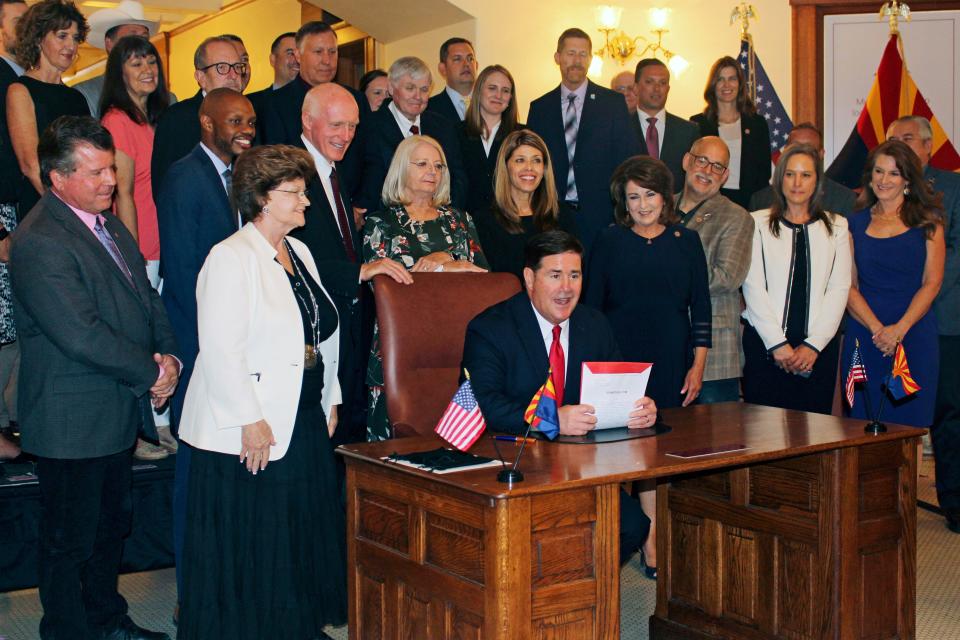Arizona is set to spend $200M on water conservation, but tribes need access
- Oops!Something went wrong.Please try again later.
A wide variety of projects across Arizona aiming to increase water efficiency and conservation could come to fruition in the next couple of years using $200 million in state grants that were approved as part of a $1 billion measure last year.
Cities, counties and irrigation districts, among other public entities, can apply for up to $3 million in grants for their water conservation programs and $250,000 for projects. These can range from research and education efforts to programs for residential improvements to watershed restoration.
Nonprofits can also apply for the fund in partnership with a public entity or water provider. All proposals require a 25% match.
Indian tribes were not included as eligible applicants within the legislation approved last year and now lawmakers are trying to mend that mistake during this legislative session.
The first round of applications opened April 18 and will close on May 19. The money, coming from the Water Conservation Grant Fund, will be administered by Arizona's Water Infrastructure Finance Authority, or WIFA, an independent state agency established by the Legislature in 1989.
As of now, board and committee members said, there is no ironclad criteria for awarding the funds nor a quota for certain types projects or applicants. Proposals will be evaluated in a case-by-case basis on their feasibility and effectiveness to make long-term reductions on water use, improve water use efficiency and improve water reliability.
Arizona drought: What's the status of water's future in Arizona? Here are 7 things we know

Money could fund an array of ideas
The funds are part of a sweeping water package that Ducey introduced in the last year of his administration, a measure that could someday lead to larger scale projects, such as a water desalination plant. The $200 million for conservation was added to the bill late in the process.
"We want to see tangible water savings coming from the money, and we want to see it benefiting as many Arizonans as possible," said Chelsea McGuire, assistant director of external affairs with WIFA and former director of government relations with Arizona Farm Bureau Federation.
Another expectation is that the money goes to a wide variety of recipients and projects. WIFA's water conservation grant committee aims to ensure that.
Within the committee are representatives of large and small public water systems, counties, academia, non-governmental organizations, and a natural resource conservation district.
Arizona has a water supply problem. Why you shouldn't fear recycled water for drinking
Kimberly Schonek, water program director for the Nature Conservancy in Arizona and chairperson of the committee, says she is excited about the variety of projects they expect to see. It's important the projects are not predetermined but come from the solutions and needs that people on the ground identify.
"What's happening in the White Mountains is very different than what goes on in Yuma. We wanna make sure we are representing the full state and that we are not setting criteria upfront that may restrict projects that are beneficial to those other areas," she said.
The next round of applications will likely open in June, and the committee will continue to receive applications on a rolling basis until June 2024 or until the funds ran out.
McGuire said the timelines to award grants and make expenditures come from federal guidelines, as the money comes from this administration's American Rescue Plan fund. Awarded entities will have to spend the money by December 2026.
"We want to see as many (applications) come in as possible. Having too many for $200 million would be a great problem for us to have," McGuire said.
WIFA would like to make this a longer term grant program, she said, and once they get the $200 million "out the door and on the ground across the state doing good things that result in water savings," ask additional funds from the Legislature.
Water updates: Colorado River reservoirs buoyed by snowmelt, but officials brace for drier times ahead

Tribes excluded from funds in 'oversight'
The bill appropriating $200 million for water conservation grants did not consider Indian tribes as eligible applicants. Other WIFA programs, like the $40 million Water Supply Development Fund, do.
"That was a complete oversight, we believe, it was something that was always anticipated but didn't end up in the definition," McGuire said.
Arizonan Indian communities will not be able to compete for funding until the omission is fixed.
“Unfortunately, this is not the first time tribes are excluded or not considered during the drafting and passing of legislation," Pascua Yaqui Chairman Peter Yucupicio told The Arizona Republic. "A 'technical' oversight means that some tribes may not have an opportunity to implement plans to conserve water during a drought.
"Things like low-flow faucets and showers or rain harvesting programs will have to be postponed."
The omission leaves out 22 tribal nations, whose territory in Arizona comprises over 20 million acres. More importantly, it cannot create water conservation opportunities for over 200,000 residents living on tribal lands.
Amendments to the eligibility criteria were submitted by Sen. Sine Kerr, R-Yuma, in SB1390.
But those amendments created new complications.

There was an agreement that amendments to the bill would only seek to include tribal entities as eligible applicants, said Sen. Priya Sundareshan, D-Tucson, who voted against the bill. But the language introduced in SB1390 could also allow access to others, like private farms and very large private entities, she said. That sparked discussions on needs to correct the language of the bill again.
Sundareshan, who is also a non-voting member of the WIFA board, said broad language within the bill amendment could bring unintended consequences.
"If a large utility or company could take advantage of the grants and take a large portion of that then there is a lot less available for the smaller players," she added.
The bill is still in the House and might go back to the Senate for future amendments, Sundareshan said.
"We've been in discussion with the sponsor of the bill and other house members trying to ensure that the bill as amended does not drastically open the door to entities far and wide," she said.
McGuire said she has met with representatives of all sorts of public entities, big and small cities, irrigation systems and natural resources conservation districts. She said she looks forward to ramping up that outreach with tribal representatives as soon as they are "officially be eligible to apply."
"We anticipate we are going to see all those folks coming to the table with ideas for programs and projects to get funded. and that's really the goal, that diverse representation," she said.
The public can comment on the applications submitted for funding. These will be posted on the public meeting agendas of the grant committee and board.
'Water is power': Republican lawmakers pressure Scottsdale over community's water shutoff
Clara Migoya covers environment issues for The Arizona Republic and azcentral. Send tips or questions to clara.migoya@arizonarepublic.com.
Environmental coverage on azcentral.com and in The Arizona Republic is supported by a grant from the Nina Mason Pulliam Charitable Trust. Follow The Republic environmental reporting team at environment.azcentral.com and @azcenvironment on Facebook, Twitter and Instagram.
Support environmental journalism in Arizona. Subscribe to azcentral today.
This article originally appeared on Arizona Republic: Arizona will award $200M in water conservation grants

